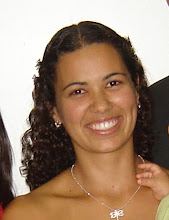0
comentários
Posted in
Segue as respostas da atividade feita no caderno sobre o Present Perfect
1. Complete the dialogue:
J: What are those people looking at? What HAS HAPPENED?
M: A cat HAS JUMPED from the window in the building next door.
J: Really! The poor thing! HAS it HURT itself? Tell me what happened?
M: Well, it seems that the cat WAS on the window sill of the 9th floor apartment and fell onto the balcony of the 5th floo. The owner HEARD the noise and WENT to the balcony. He saw the cat and CALLED the doorman to help him.
J: When DID this HAPPEN?
M: About 10 minutes ago.
J: HAS anyone called for help?
M: Yes, a vet HAS already ARRIVED.
2. Complete the dialogue:
A: Look! Somebody HAS LEFT the kitchen tap on. The sink is full of water.
B: It WASN´T me. I DIDN´T DO it.
A: HAVE you SEEN Lara?
B: No. I HAVEN´T SEEN her
A: Chris isn´t at work. She HAS BROKEN her arm.
B: How DID she DO that?
A: She FELL down the stairs.
A: Where DID you GO last night?
B: I WENT to the theater.
3. Put the words in the correct order:
a) Have you seen any good movies lately?
b) How long has she worked there?
c) They haven´t written to me recently.
0
comentários
Posted in
Pessoal segue abaixo nossa atividade de hoje juntamente com as respostas conforme havíamos combinado:
0
comentários
Posted in
Pessoal segue abaixo as respostas da atividade em folha de revisão para nossa globalizada
0
comentários
Posted in
I hope you enjoy it!
0
comentários
Posted in
Pra galera que está com dificuldades na língua inglesa, segue a dica de um curso online gratuito.
Basta acessar o site, se matricular e começar a estudar. Podem me adicionar para a correção das atividades propostas pelo curso. Quem tiver interesse em aprender um outro idioma o site também oferece outros cursos. APROVEITEM!!!!!
http://www.livemocha.com
0
comentários
Posted in
http://www.solinguainglesa.com.br/conteudo/pronomes2.php
http://www.ego4u.com/en/cram-up/grammar/pronouns/exercises?03
http://www.ego4u.com/en/cram-up/grammar/pronouns/exercises?04
http://learnenglish-online.com/grammar/tests/possessive.html
http://learnenglish-online.com/grammar/tests/possessive2.html
Podem imprimir e colar no caderno. Dúvidas me procurem na nossa próxima aula.
0
comentários
Posted in
Primeiro campeonato internacional
A Copa do Mundo
0
comentários
Posted in
Read more in portuguese in http://pt.wikipedia.org/wiki/Mergulho_aut%C3%B4nomo
0
comentários
Posted in
Read more in http://kayaking.org/index.html
0
comentários
Posted in
Sport (or, in the USA, sports) is all forms of competitive physical activity which, through casual or organised participation, aim to use, maintain or improve physical fitness and provide entertainment to participants. Hundreds of sports exist, from those requiring only two participants, through to those with hundreds of simultaneous participants, either in teams or competing as individuals.
Read more in http://en.wikipedia.org/wiki/Sport














































.jpg)
.jpg)
.jpg)


